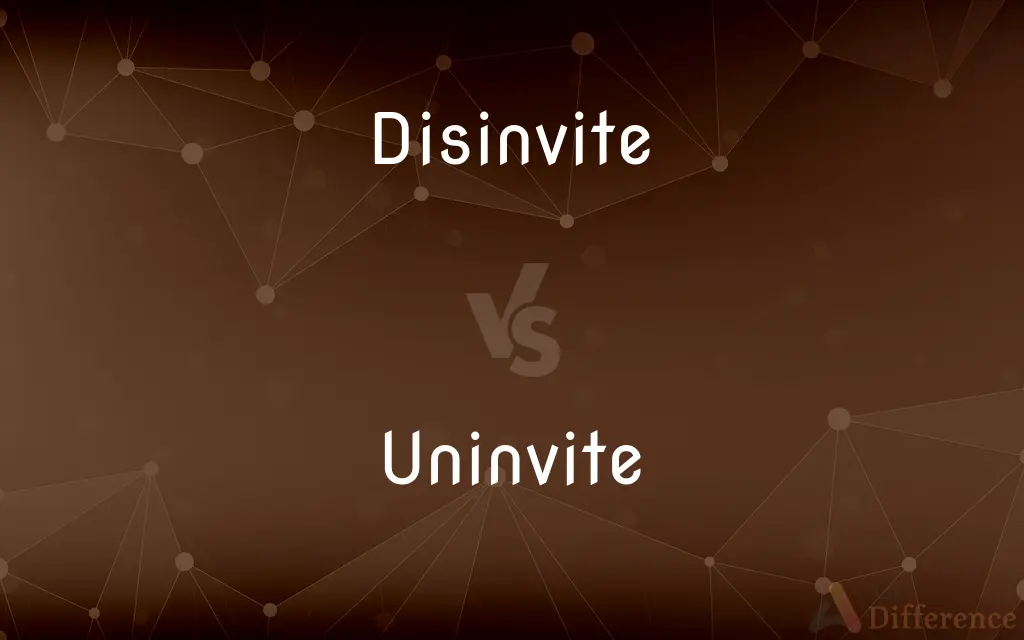Disinvite vs. Uninvite — What's the Difference?
Edited by Tayyaba Rehman — By Maham Liaqat — Updated on April 25, 2024
"Disinvite" means to revoke an invitation previously extended, focusing on the formal withdrawal. "Uninvite" colloquially implies revoking an invitation, often used informally.

Difference Between Disinvite and Uninvite
Table of Contents
ADVERTISEMENT
Key Differences
"Disinvite" is a formal term used to describe the action of rescinding an invitation that was previously given. It carries a connotation of official or polite revocation. In contrast, "uninvite" is often used in casual contexts and may not always be recognized as standard by all speakers.
While "disinvite" is typically used in more serious or formal situations, such as official events or gatherings where etiquette is important, "uninvite" is commonly used among friends or in less formal scenarios. This usage reflects a more relaxed approach to communication.
In terms of language, "disinvite" is generally accepted in formal writing and professional communication. On the other hand, "uninvite" might appear in informal texts or dialogues, illustrating a less structured use of language.
The choice between "disinvite" and "uninvite" can also reflect the tone and seriousness of the situation. With "disinvite," the implication is that there might be a significant reason or necessity behind the retraction. Meanwhile, "uninvite" can sometimes carry a lighter or less consequential tone.
Disinvite tends to be clearer in its meaning, firmly establishing that the person is no longer welcome to the event. Whereas, "uninvite" can occasionally be perceived as ambiguous or less forceful, potentially leading to misunderstandings about the invitation status.
ADVERTISEMENT
Comparison Chart
Formality
More formal, used in official communications
Less formal, often used in casual speech
Connotation
Polite, official revocation of an invitation
Informal, casual revocation of invitation
Common Usage Scenario
Formal events, professional settings
Informal gatherings, among friends
Tone
Serious and clear
Casual and potentially ambiguous
Recognition in Formal Writing
Widely recognized and accepted
Less recognized, may not be used in formal texts
Compare with Definitions
Disinvite
To withdraw an invitation for a specific reason.
He was disinvited from the conference after the controversial remarks.
Uninvite
To revoke an invitation in a casual way.
She had to uninvite her friend from the party after the misunderstanding.
Disinvite
To cancel an invitation in a polite manner.
Due to unforeseen circumstances, we must disinvite some of our initial attendees.
Uninvite
To casually withdraw an invitation.
They uninvited several people due to the change in plans.
Disinvite
To exclude someone from a list of guests after inviting them.
The company disinvited the consultant after the project was postponed.
Uninvite
To informally tell someone they are no longer invited.
He decided to uninvite his classmate after their argument.
Disinvite
To formally revoke an invitation.
The host had to disinvite some guests due to venue capacity limits.
Uninvite
To remove someone from the guest list non-officially.
They uninvited him from the group outing at the last minute.
Disinvite
To tell someone they are no longer welcome at an event.
She felt obligated to disinvite her ex-boyfriend to avoid drama.
Uninvite
To cancel an invitation with a casual tone.
He was uninvited after failing to respond to the RSVP.
Disinvite
To rescind an invitation to
Disinvited our friends for dinner because of an emergency.
Uninvite
(transitive) To cancel or withdraw an invitation.
Disinvite
(transitive) To cancel an invitation to (someone).
Common Curiosities
Can I use "disinvite" in a casual conversation?
While you can use "disinvite" in casual conversations, it might sound overly formal compared to "uninvite".
What is the main difference in the usage of disinvite and uninvite?
"Disinvite" is used in more formal or serious contexts, whereas "uninvite" is suitable for casual or informal settings.
Are both terms recognized in English dictionaries?
"Disinvite" is commonly recognized, but "uninvite" might not be listed in more conservative dictionaries.
What does disinvite mean?
Disinvite means to formally and officially revoke an invitation.
Which term should I use if I need to cancel an invitation politely?
"Disinvite" is recommended for a more polite and clear communication, especially in formal situations.
What does uninvite mean?
Uninvite is the informal act of revoking an invitation, usually used among acquaintances.
Is there a better alternative to these terms if I need to cancel an invitation due to an emergency?
Explaining the situation directly, perhaps using terms like "cancel" or "postpone," might be more suitable in emergencies.
Do these terms have different connotations in different English-speaking countries?
The usage and acceptance might vary, but generally, "disinvite" is universally understood in formal contexts across English-speaking countries.
Is it acceptable to use "uninvite" in formal writing?
Typically, "uninvite" is not preferred in formal writing; "disinvite" is more appropriate.
How can I use these terms without offending someone?
Communication should always include a clear explanation and, if possible, a polite expression of regret for any inconvenience caused.
Can uninvite be perceived as rude?
Depending on the context and tone, "uninvite" can sometimes be perceived as less thoughtful or abrupt.
How should I communicate if I have to disinvite someone due to limited space at an event?
It's best to explain the situation honestly and politely, using "disinvite" to convey the formality and necessity of the decision.
Is there a historical difference in the usage of disinvite versus uninvite?
"Disinvite" has a longer history in formal English usage, while "uninvite" has gained popularity in more recent, informal contexts.
What impact does the choice between these words have on communication?
Choosing between "disinvite" and "uninvite" can affect the perceived formality and clarity of the communication.
What should I consider before deciding which term to use?
Consider the context, your relationship with the invitee, and the desired tone of your message when choosing between "disinvite" and "uninvite".
Share Your Discovery

Previous Comparison
Xenogeneic vs. Allogeneic
Next Comparison
Fantasize vs. FantasiseAuthor Spotlight
Written by
Maham LiaqatEdited by
Tayyaba RehmanTayyaba Rehman is a distinguished writer, currently serving as a primary contributor to askdifference.com. As a researcher in semantics and etymology, Tayyaba's passion for the complexity of languages and their distinctions has found a perfect home on the platform. Tayyaba delves into the intricacies of language, distinguishing between commonly confused words and phrases, thereby providing clarity for readers worldwide.












































